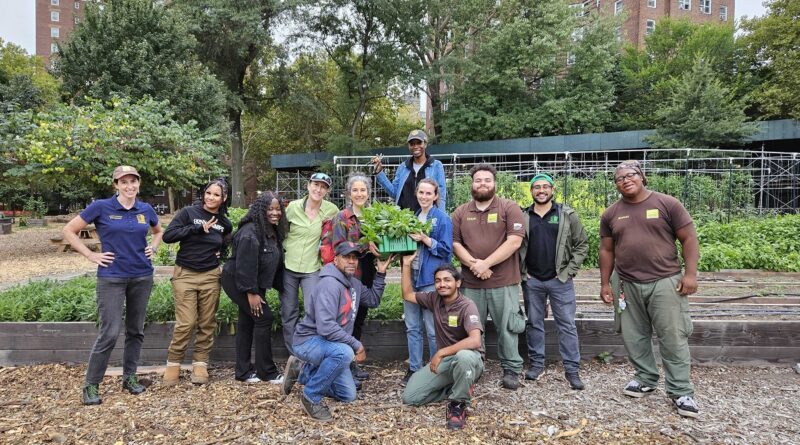Climate Week NYC: NYCHA Sustainability Programs Highlighted at Staff Events
Climate Week NYC brought together business leaders, political changemakers, and civil society representatives from all over the world for opportunities to promote climate action, speed up progress, and champion change in our communities.
Among the local leaders were NYCHA’s Senior Director of Sustainability Siobhan Watson and Senior Vice President for Capital Programs Joy Sinderbrand, who joined Climate Week panels to highlight Authority programs and initiatives that help to make communities more sustainable and resilient and protect them against climate change.
On September 24, Ms. Watson served as a moderator for the panel, “A Sustainable Future for Public Housing: How NYCHA Is Addressing Climate and Quality of Life.” The panel, presented by the Regional Plan Association at the TransitCenter in Manhattan, examined NYCHA’s efforts to implement innovative climate solutions at its properties, focusing on strategies that leverage the Authority’s specific site conditions, building designs, and scale.
In addition, Ms. Watson said the discussion highlighted some of the partnerships that have helped NYCHA make progress on its climate goals. Other panelists included representatives of the New York Power Authority, WE ACT for Environmental Justice, and AECOM.
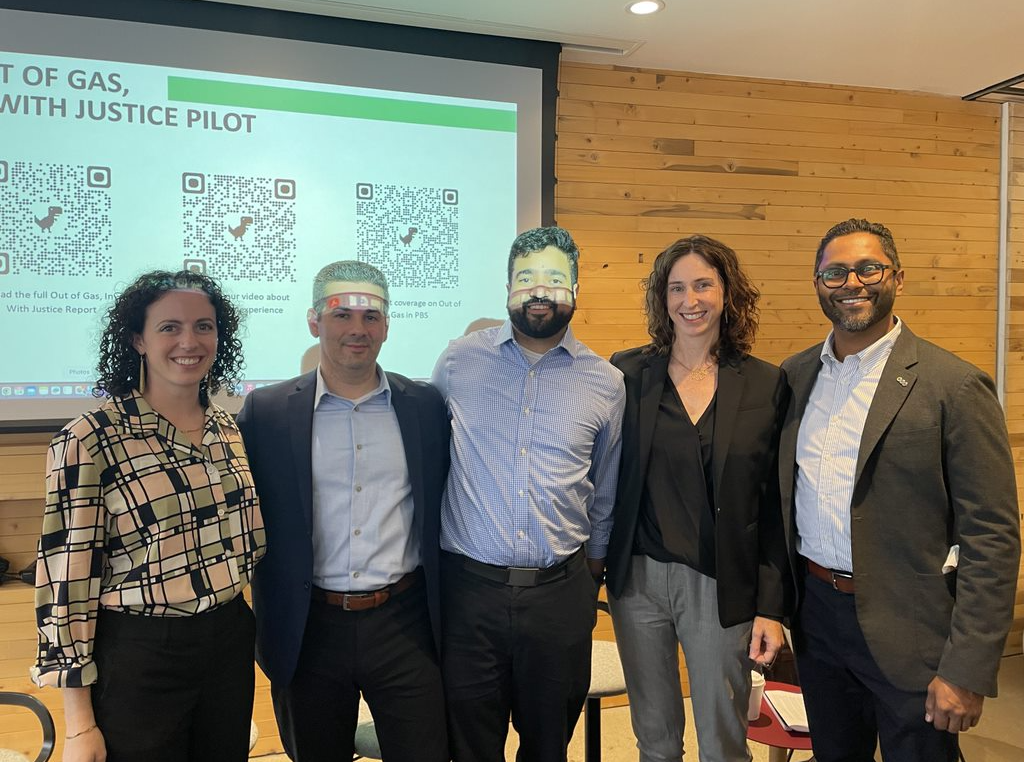
Later that day, Ms. Watson attended a summit, “Climate Resilient Infrastructure: Building a More Sustainable Future,” presented by the Federal Emergency Management Agency (FEMA) and the U.S. Environmental Protection Agency. The event, which brought together public, private, and academic partners, aimed to explore resilient infrastructure challenges and innovative solutions.
Ms. Watson participated on the panel, “From Efficiency to Net Zero: Strategies for Resilient Buildings.” The panelists discussed innovative approaches to achieving net-zero energy buildings and enhancing energy efficiency within disaster recovery programs. Topics included disaster-resilient building codes, energy security, and the role of sustainable building practices, including the Clean Heat for All Challenge, in reducing greenhouse gas emissions.
On September 25, Ms. Sinderbrand was a featured panelist at a Climate Week NYC symposium, “Future Proofing New York: Planning for the New Normal,” presented by the Regional Plan Association and AECOM at the latter’s office in Manhattan.
Ms. Sinderbrand participated on the panel, “From Vision to Action,” which examined resilient infrastructure projects and addressed how organizations are working to move from vision to action across a variety of scales. Other panelists included representatives of New York University, NYC Department of Environmental Protection (DEP), and ReAL Edgemere Community Land Trust.
Regarding resiliency and sustainability investments, Ms. Sinderbrand said ongoing operations and maintenance are key factors that help determine if the capital projects are successful.
“Engaging with Operations and Property Management early and often – not just as a design input early on – is a key to success, and we are increasing our touchpoints before, during, and after capital projects,” she said.
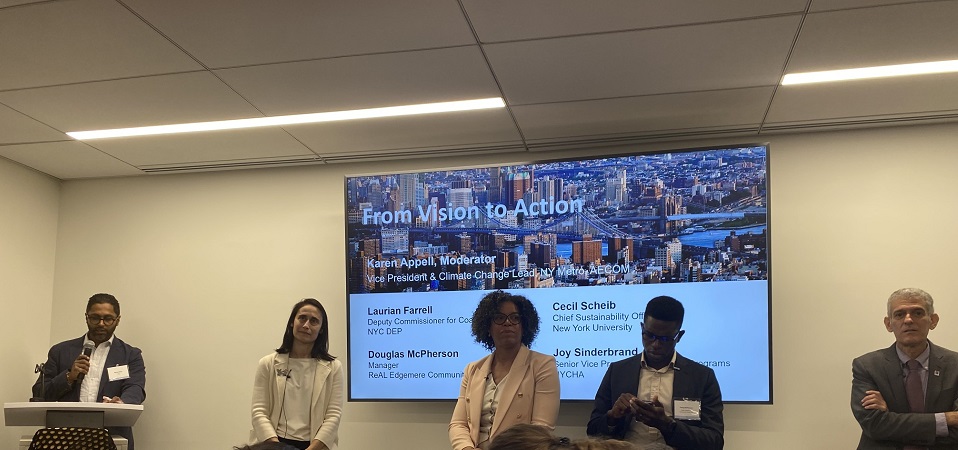
Other Climate Week activities featuring NYCHA staff included:
On September 23, Green City Force alumni gave a presentation at NYCHA’s Long Island City office on the latest NYCHA tree inventory in collaboration with the NYCHA Sustainability team.
On September 24, Edwin Mendez, Deputy Director of Energy Programs, gave a virtual presentation highlighting recent energy efforts at NYCHA during partner WE ACT for Environmental Justice’s monthly meeting.
Mr. Mendez also led a table discussion at AEG’s “NYC Health, Energy, and Equity Action Challenge” on September 27 at Columbia University. Speakers presented a critical obstacle that needs collaboration and a near-term solution.
On September 26, Katy Burgio, Deputy Director of Sustainability Programs, gave a presentation on cloudburst programs at the forum, “Co-Exploring Urban Climate Resilience at the Watershed Scale.” The event was co-hosted by CUNY, Ramboll, and WSP at the CUNY Graduate Center, exploring issues associated with holistic watershed approaches for urban climate resilience.
Throughout the week, nearly 50 NYCHA staff members volunteered to support nonprofit partner Green City Force (GCF) at their Eco-Hubs at Bay View Houses, Forest Houses, and Mariner’s Harbor Houses. Employees joined GCF members to help prepare the urban farm sites for the fall and winter farming seasons by pulling weeds, raking, mulching, and harvesting crops. NYCHA staff also pitched in to assist the Inner City Green Team with its door-to-door recycling program at Wagner Houses, where they provided information to residents about recycling collection and reuse initiatives.
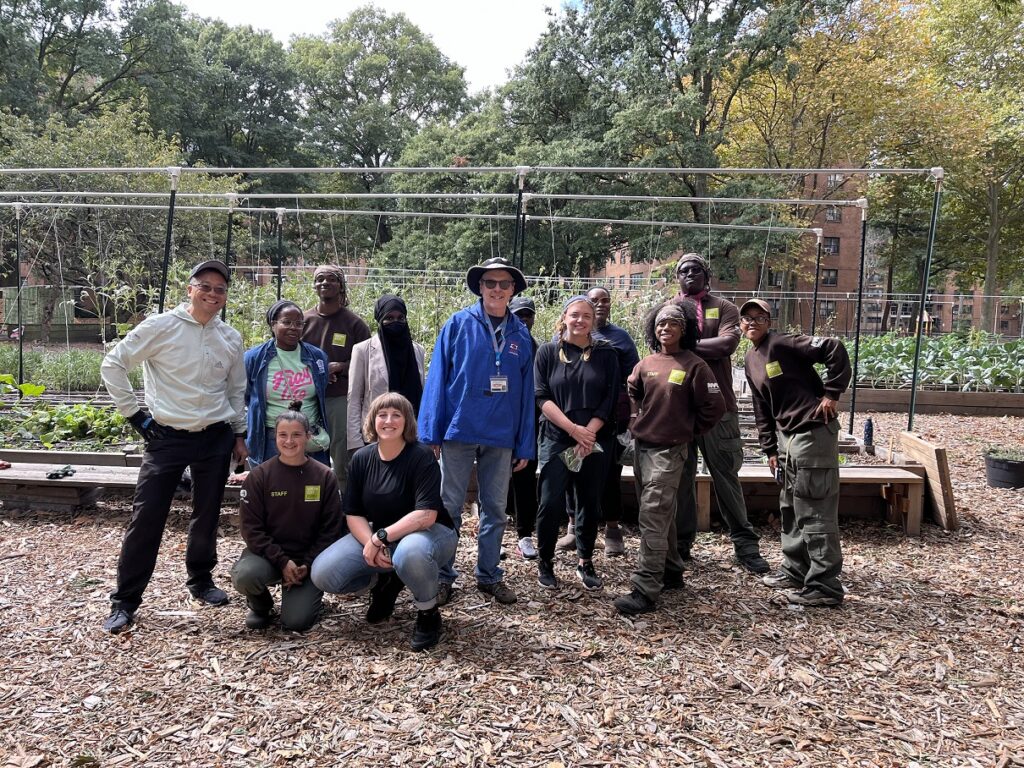
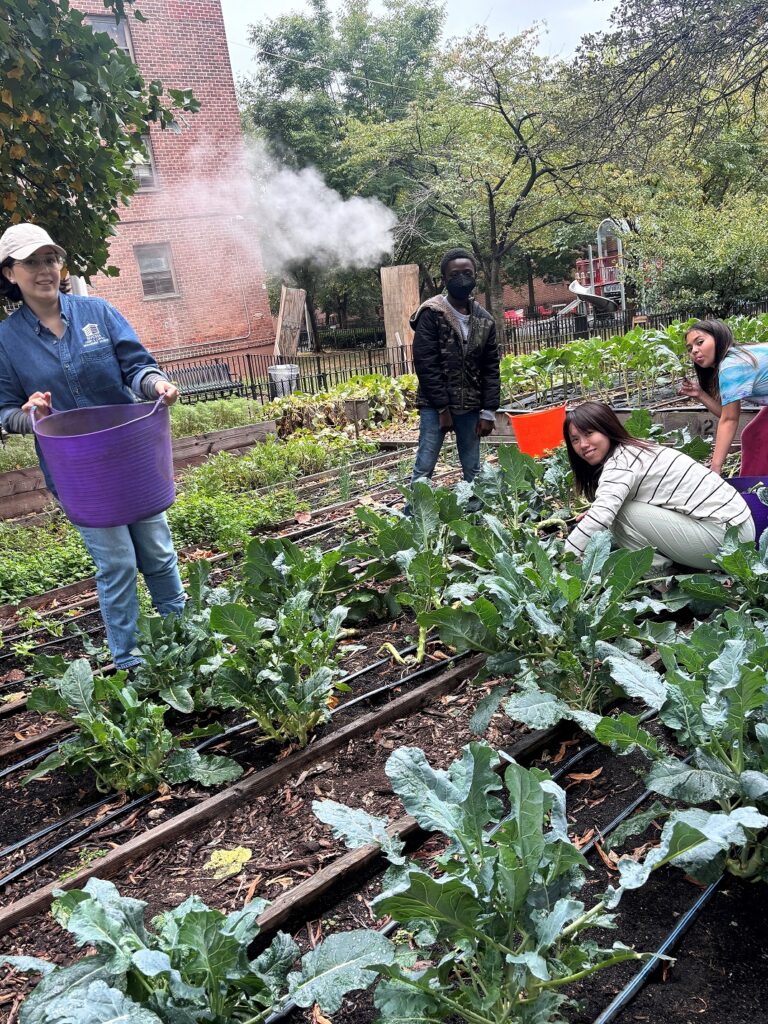
NYCHA staff volunteered with members of Green City Force to help prep Eco-Farms at Bay View Houses (left) and Mariner’s Harbor Houses (right).
In addition to the NYCHA staff activities, NYC Emergency Management (NYCEM) participated in a Climate Week tour of East Harlem’s Clinton Houses on September 26, along with representatives from NYCHA’s Sustainability team, NYC DEP, FEMA, and the State Division of Homeland Security and Emergency Services. The development tour was offered as an opportunity to explore the future of disaster response and climate resilience. Representatives highlighted a FEMA grant through the Building Resilient Infrastructure and Communities (BRIC) program.
More than $7.8 million in funding has been allocated to improve stormwater resiliency by increasing flood storage, enhancing drainage systems, and installing green infrastructure features on the Clinton Houses campus. The cloudburst project, which includes hazard mitigation and upgrades to the grounds, is intended to benefit residents on a day-to-day basis and not just during extreme weather events.
Featured photo caption: During Climate Week, NYCHA employees assisted Green City Force members with preparing the Eco-Hub at Forest Houses for the fall and winter farming seasons.

